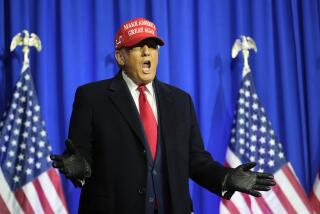Japan-Based Local Firms React Mildly to Pending Tariffs
While domestic electronics companies are lining up strongly in favor of selective tariffs on Japanese electronic products to retaliate for Tokyo’s failure to abide by a semiconductor trade agreement with the United States, Japanese-owned firms in Orange County are reacting mildly to the pending import tariffs.
Some of the Japanese-owed companies in the county--corporate home of the U.S. arms of many of Japan’s largest electronics firms--said that they had been anticipating the possibility of the punitive sanctions and already had increased production at their local plants. Others said it was still too early to predict the effect that the tariffs would have on their sales and operations.
The tariffs, the United States’ first post-World War II trade sanctions against Japan, were announced by President Reagan late last week to underscore the government’s concern that Tokyo has not given American semiconductor manufacturers and other manufacturers greater access to its huge market.
The American Electronics Assn., the industry’s major trade group, said Monday that it supports the tariffs.
The chief concern has been for American makers of semiconductors, who have seen their markets eaten away by lower-priced Japanese goods.
Effect Unclear
Although sanctions generally have been endorsed within the American high-tech community, their effect largely remains unclear.
In announcing the decision last week to impose 100% tariffs on some Japanese electronic goods beginning April 17, the government did not specify which products would be hit with the extra taxes.
However, the government said it would tax finished consumer goods, and not Japanese computer chips, in order to avoid harming U.S. manufacturers who rely on imported chips for their products. On the list of potential targets are air-conditioning machines, refrigerating equipment, cash registers, computers, television parts, camera film and stereo equipment.
Among Orange County’s growing number of Japanese-based companies are several whose operations have been expanded over the last several years to include manufacturing and assembly, operations that have been increased in recent months in preparation for the long-threatened tariffs.
Kazushige Okabe, chief financial officer of Hitachi Consumer Products in Anaheim, said his company recently cut back on importing from Japan and started making more television sets in Orange County in anticipation of the new tax.
However, Okabe said the company had not decided how to handle its operations involving video cassette recorders, which rely on Japanese robotics and other products that are more difficult to reproduce in the United States. He said the company may be forced to pass along any increased tariffs on its products to consumers.
Okabe said Hitachi Consumer Products, which distributes TVs and VCRs throughout North America, imports about $24 million worth of goods from Japan each year.
At Fujitsu Business Communications in Anaheim, President Jose Reines said his company, which makes telephone switchboard units, may not be hard hit by the tariffs if they are aimed exclusively at finished consumer goods. Fujitsu, Reines said, uses imported Japanese components to assemble its products in its local factory. Sales of locally produced switchboards, he said, exceed $100 million annually.
“We think we’ll be OK,” Reines said. “But we’re hopeful this madness will come to an end soon.”
More to Read
Inside the business of entertainment
The Wide Shot brings you news, analysis and insights on everything from streaming wars to production — and what it all means for the future.
You may occasionally receive promotional content from the Los Angeles Times.










